12 Popular Food Myths Dispelled! |
|
|
When it comes to food, health and
nutrition, there are many myths out there. Some were put out there on
purpose to sell you more products, some are just misconceptions that
have thrived over the years because, on the surface of it, they sound
logical. So let's set a few things straight:
|
|
|
1. Swimming with a full stomach is deadly dangerous.
You may weigh a bit more with the
food in you, but you won't drown, as long as you're swimming for fun. If
you are competing, it may cause some cramping. However, drinking is a
very bad idea, as a 1990 study of hundreds of drowning deaths found that
41% were alcohol related.
|
 |
|
|
|
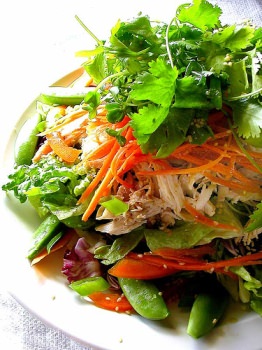 |
2. Eating raw food is healthier than eating food that has been heated up
This one is both right and wrong.
It's true that raw fruit and raw vegetables have more nutritional value
than heated. However, not everything is safe to consume raw. For
example, raw bens and eggplants may contain toxic materials that
evaporate when heated.
So make sure you know for sure that what you are eating raw isn't actually poisonous if not cooked.
|
|
|
|
|
3. If you want your eye sight to get much better, eat carrots for their vitamin A.
Not quite. Carrots don't contain
vitamin A, they contain beta carotene, which the body may convert to
vitamin A. But eating a lot of carrots does not significantly help your
eye sight, and beta crotene can be found in lots of yellowish, orange
and dark green fruits and vegetables.
|
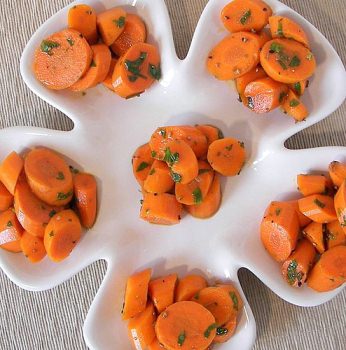 |
|
|
|
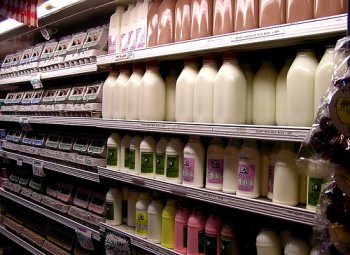 |
4. Whole milk is more nutritious than is skimmed milk.
Skimmed milk is the healthiest milk.
Its fat content is below 0.5% while whole milk has a fat content of over
3.25%. It has all the same nutritional values of whole milk, with the
exception of vitamin A, which your body usually has a great supply of.
If you want to watch your weight, drink skimmed milk.
|
|
|
|
|
5. Health food is too expensive.
Doesn't have to be.
Time + Process effort = cost.
Fruits and vegetables aren't usually
very pricey, but here are some ideas to save you on expenses. Grains
with long shelf life can be a great investment in your health. Grains
like oats, lentils, chickpeas, and brown rice. If you're buying meat,
don't buy lean cuts but the whole chicken, it'll be cheaper to just
remove the bones and skin yourselves.
Same with beef and just trim the fat yourselves, portion and freeze it. It's not much work and will save you good money.
|
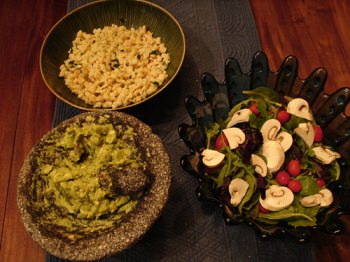 |
|
|
|
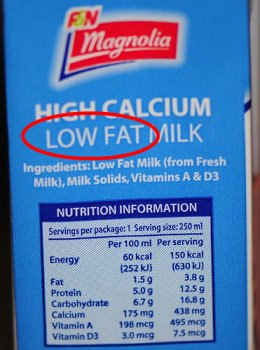 |
6. Product titles that contain the words 'Low Fat' or 'Reduced Fat' are better than those that don't.
Remember that energy = calories.
The fat that is stored in our body is
actually untapped energy. This energy doesn't just come from fat, it
comes from carbohydrates and proteins as well. So just because a product
says low fat doesn't mean it's low on the amount of energy it will
store in your body, which will be converted to... you guessed it, fat.
|
|
|
|
|
7. It's better to just eat all vegetarian foods.
Not necessarily.
There are many processed foods that
have very little nutritional value. However, lean red meat is low in
fat, so is skinless chicken and fish, when they are cooked without the
skin and not in oil.
|
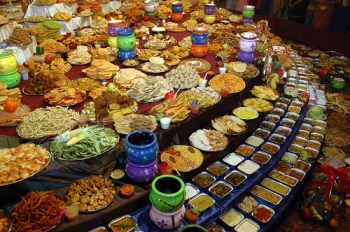 |
|
|
|
 |
8. Food coloring is harmful to the body
By food coloring, we mean any
pigment, dye or any other substance that adds color to food. They are
used for many reasons, but after many studies have been held, decades
ago, they were pronounced completely safe.
|
|
|
|
|
9. Additives and preservatives are unhealthy to eat
Additives are added to food to keep
it stable, safe and to slow down it being spoiled so there is no
foodborne disease. This is mainly used in foods like cheese or wine
using harmless bacteria or yeasys.
Some foods, like ham and bacon, are
only safe to eat after preservatives have been used. Ice cream tastes as
good as it does due to additives. There is no health risk, and actually
most foods look and taste better when these are applied.
|
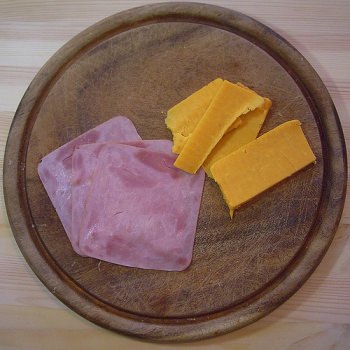 |
|
|
|
 |
10. Eating after certain hours makes you fat
Many believe that eating after 7 pm
will help make you gain weight. The truth is, it's not when you eat,
it's WHAT you eat. Most people snack after these hours, more than any
other time of day. The important thing is to eat at fixed, regular
times, at least 2-3 hours before bedtime.
|
|
|
|
|
11. Eating big, full meals 3 times a day is better than eating smaller, frequent meals.
Wrong. Imagine the food you eat as
filling a glass. When you eat small meals frequently, the water is
consumed whenever you need it. But when you eat only a few large meals a
day, you tend to eat more than you need at that point in time, meaning
the water fills up the glass and drips off - straight to your fat
reserves.
So eat when you feel hungry, just
make sure you eat enough to feel full, no more than that, and slowly
enough so that your body has time to register how much you are eating
and alert you (with stomach aches) if you eat too much.
|
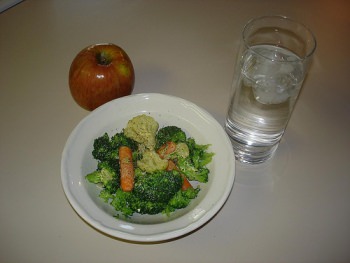 |
|
|
|
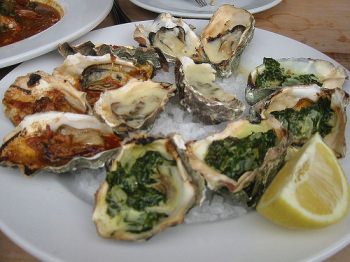 |
12. Oysters are an aphrodisiac
Really sorry to bust this one, but
there are NO erotic foods. Our sex drive is mostly in the mind, and so
if you think oysters awaken your sex drive - they probably will.
|
samedi 10 mai 2014
12 Popular Food Myths Dispelled - Fascinating!
Inscription à :
Publier les commentaires (Atom)
Aucun commentaire:
Enregistrer un commentaire